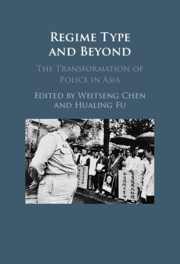Book contents
- Regime Type and Beyond
- Regime Type and Beyond
- Copyright page
- Contents
- Figures
- Tables
- Contributors
- Abbreviations
- Part I Framework
- Part II Authoritarian Policing: Past and Present
- Part III Democratic Transition and Authoritarian Resilience
- Part IV The Singapore and Hong Kong Exceptions
- 11 Democratic Policing in an Authoritarian State?
- 12 Empires Collaborate
- 13 The End of Soft-Style Protest Policing in a Hybrid Regime
- Part V Conclusions
- Index
12 - Empires Collaborate
Geopolitics of Colonial Policing in Hong Kong (1880s–1970s)1
from Part IV - The Singapore and Hong Kong Exceptions
Published online by Cambridge University Press: 25 May 2023
- Regime Type and Beyond
- Regime Type and Beyond
- Copyright page
- Contents
- Figures
- Tables
- Contributors
- Abbreviations
- Part I Framework
- Part II Authoritarian Policing: Past and Present
- Part III Democratic Transition and Authoritarian Resilience
- Part IV The Singapore and Hong Kong Exceptions
- 11 Democratic Policing in an Authoritarian State?
- 12 Empires Collaborate
- 13 The End of Soft-Style Protest Policing in a Hybrid Regime
- Part V Conclusions
- Index
Summary
To date, most scholarly work on historical Hong Kong policing has focused on the relationship between the governing and governed within a local setting. This approach explains policing solely within the confines of the juxtaposition of the authoritarian power of the colonial government on the one hand with the individual rights and liberties of the colonized on the other. This chapter, which draws upon archival documents from the nineteenth and twentieth centuries showing how public media in Hong Kong were systematically censored, placed under police surveillance, and prosecuted for political reasons, argues that collaboration among the imperial empires to safeguard their interests in East Asia contributed significantly to Hong Kong policing during that period. Hence, this chapter argues that Hong Kong policing was historically not solely a matter of domestic authoritarian governance but also an issue of global geopolitical relevance. Analyzing colonial Hong Kong policing based on the conventional framework of human rights or colonial inequality and racism without considering the bigger picture of global and regional politics is, this chapter argues, seriously inadequate. The bigger picture is the political-economic situation of China, China’s relations with the major world powers, and those powers’ China strategies over time, as this chapter’s archival discovery will discuss.
Keywords
- Type
- Chapter
- Information
- Regime Type and BeyondThe Transformation of Police in Asia, pp. 291 - 315Publisher: Cambridge University PressPrint publication year: 2023



